Related Research Articles
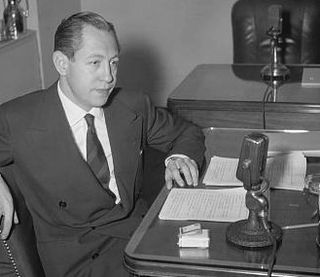
William Samuel Paley was an American businessman, primarily involved in the media, and best known as the chief executive who built the Columbia Broadcasting System (CBS) from a small radio network into one of the foremost radio and television network operations in the United States.
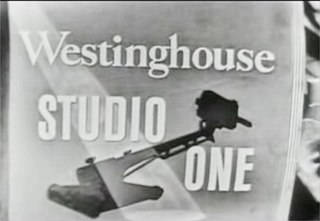
Studio One is an American anthology drama television series that was adapted from a radio series. It was created in 1947 by Canadian director Fletcher Markle, who came to CBS from the CBC. It premiered on November 7, 1948, and ended on September 29, 1958, with a total of 467 episodes over the course of 10 seasons.

American Playhouse is an American anthology television series periodically broadcast by Public Broadcasting Service (PBS).

CBS Playhouse is an American anthology drama television series that aired on CBS from 1967 to 1970. Airing twelve plays over the course of its run, the series won ten Primetime Emmy Awards and featured many noteworthy actors and playwrights.
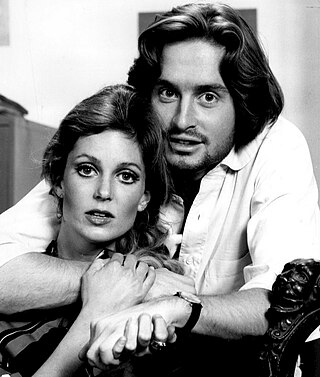
"The Experiment" is the third television play episode of the second season of the American television series CBS Playhouse. Broadcast February 25, 1969, it starred Michael Douglas as a young scientist who puts aside his liberal principles to work for a cutting-edge chemical company.
"The Tunnel" was a pre-recorded American television play first broadcast on December 10, 1959, as part of the CBS television series, Playhouse 90. It was the sixth episode of the fourth season of Playhouse 90 and the 123rd episode overall.
"The Cruel Day" was an American television play broadcast on February 24, 1960, as part of the CBS television series, Playhouse 90. It was the tenth episode of the fourth season of Playhouse 90 and the 127th episode overall.
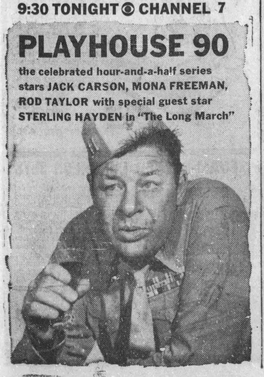
"The Long March" was an American television play broadcast on October 16, 1958, as part of the CBS television series, Playhouse 90.

"Shadows Tremble" was an American television movie that was broadcast on October 23, 1958, as part of the CBS television series, Playhouse 90.
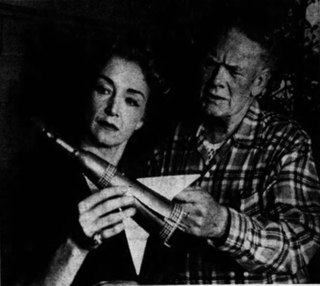
"Free Weekend" was an American television play broadcast on December 4, 1958, as part of the CBS television series, Playhouse 90.

"The Second Happiest Day" is an American television play broadcast on June 25, 1959 as part of the CBS television series, Playhouse 90.
"Nightmare at Ground Zero" is a television play that was broadcast by CBS on May 15, 1958, as part of the television series, Playhouse 90. It was written by Rod Serling and Paul Monash based on the book by John C. Clark and Robert Cahn.

"A Quiet Game of Cards" was an American television play broadcast on January 29, 1959 as part of the CBS television series, Playhouse 90. The cast included Barry Sullivan and Franchot Tone.
"Project Immortality" is an American television play broadcast on June 11, 1959 as part of the CBS television series, Playhouse 90. The cast includes Lee J. Cobb and Michael Landon.
"Diary of a Nurse" is an American television play broadcast on May 7, 1959, as part of the CBS television series, Playhouse 90. The cast includes Inger Stevens, Victor Jory, and Mary Astor. David Greene was the director and Arthur Hailey the writer.
"Dark December" is an American television play broadcast on April 30, 1959 as part of the CBS television series, Playhouse 90. The cast includes Barry Sullivan, Michael Landon, James Whitmore, and Warren Beatty. Franklin Schaffner was the director and Merle Miller the writer.
"The Dingaling Girl" was an American television play broadcast on February 26, 1959 as part of the CBS television series, Playhouse 90. The cast included Diane Varsi, Eddie Albert, and Mort Sahl. Fielder Cook was the director and J.P. Miller the writer.
"The Raider" was an American television play broadcast on February 19, 1959 as part of the CBS television series, Playhouse 90. The cast included Frank Lovejoy, Donald Crisp, and Rod Taylor. Franklin Schaffner was the director and Loring Mandel the writer.
"Child of Our Time" was an American television play broadcast on February 5, 1959 as part of the CBS television series, Playhouse 90. The cast included Robert L. Crawford Jr., Liliane Montevecchi, and Maximillian Schell. George Roy Hill was the director. The teleplay was written by Irving Gaynor Neiman as an adaptation of the book by Michel del Castillo.

"The Violent Heart" is an American television play broadcast on February 6, 1958, as part of the second season of the CBS television series Playhouse 90. John Frankenheimer directed. Dana Wynter and Ben Gazzara starred.
References
- ↑ The Paley Center for Media: CBS Playhouse: Dear Friends: Part 1.
- ↑ The Paley Center for Media: CBS Playhouse: Dear Friends: Part 2.
- ↑ TV.com: CBS Playhouse: Dear Friends.